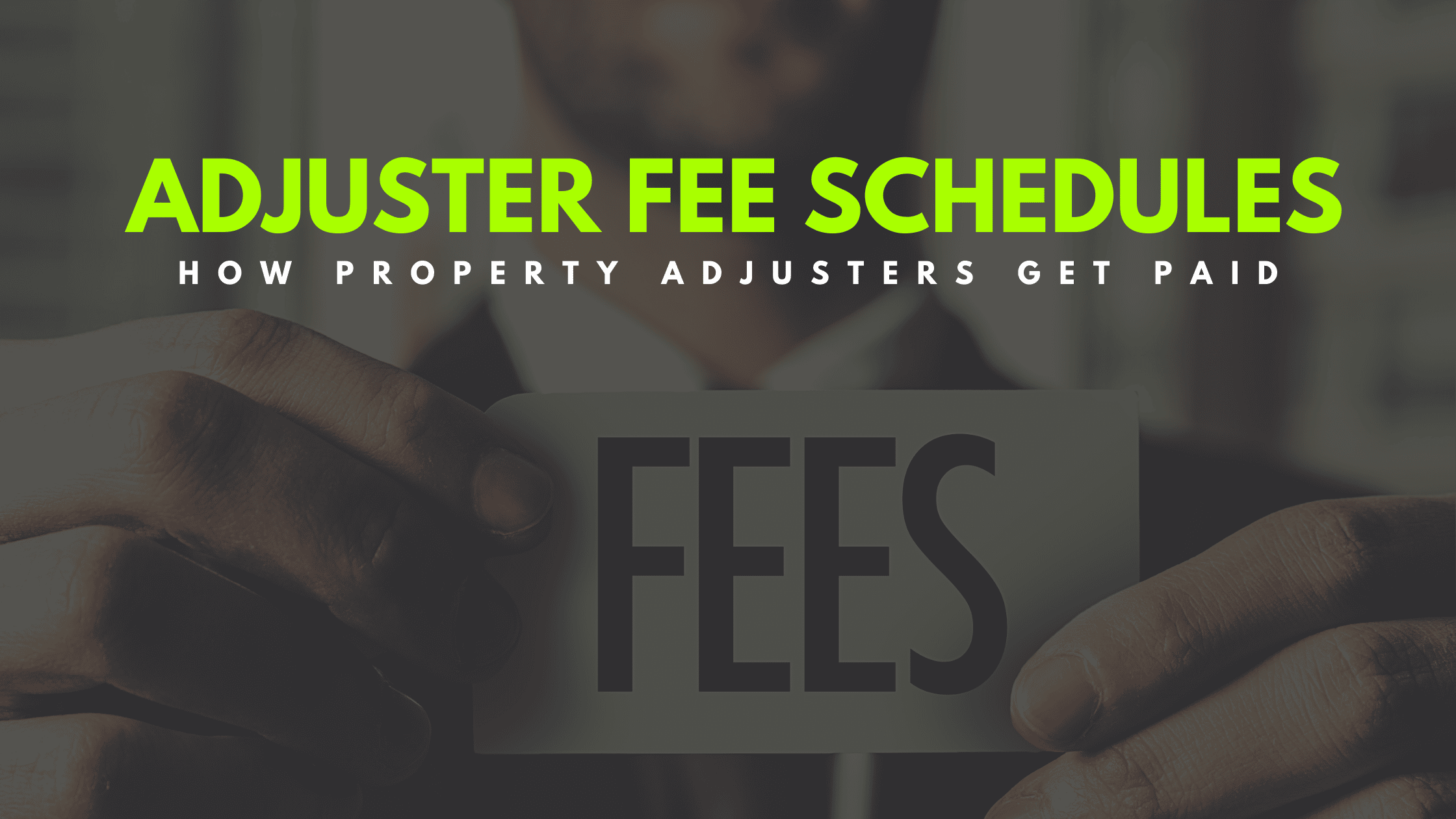
[fp_state-nickname] Being an independent adjuster can be a very lucrative and rewarding career, mainly due to the concept of the independent adjuster fee schedule.
While insurance adjusters can be salaried employees, independent adjusters have more flexibility and opportunities to make above-average earnings.
Many people hear the stories of how adjusters bring in big pay during catastrophic storms and wonder, “How do they earn SO much in such a short time?”
This article will answer all your questions about how independent adjusters get paid, and how claims adjuster fee schedules work. You’ll also learn some tips to help you negotiate higher fees and increase your earnings.
If you are looking for help getting started, check out our guide to becoming a property adjuster.
What is an independent adjuster fee schedule?
A fee schedule is a document used to determine how much an insurance company will be charged for adjusting services, on a per-claim basis.
The independent adjusting firm charges the insurance company based on these listed rates. It then pays independent adjusters to complete the work.
This fee increases with the amount of the estimate. As an example, an insurance company would pay more for an adjusting firm to handle a $100,000 loss compared to a $2,000 loss.
This agreement of what the insurance company will pay is the fee schedule.
Fee schedule example

Any claim under $14,500 results in a fee of $415.00, charged to the insurance company.
If the claim is above $14,500, the fee is $640.00.
There are also charges for additional services and locations.
What percentage of a fee schedule does an adjuster earn?
For auto claims, it is standard for adjusters to earn a flat fee plus any mileage on their completed claim. You can learn more about this career path in this article, all about auto damage appraiser and adjuster salaries.
The rest of this article will focus on how the fee schedule works for independent adjusters on property claims.
For property adjusting, the amount an independent adjuster earns is also based on the fee schedule. The adjuster earns a percentage of what the independent adjusting firm is getting paid for completing the claim.
Most independent property adjusters earn 55% to 70% of the fee schedule.
This varies depending on the company, the location, the experience of the adjuster, and how in-demand adjusters are at the time.
During major catastrophic hurricanes like Hurricane Harvey and Irma, the fee schedules were changed. Fees were increased, and some adjusters earned higher percentages because there weren’t enough adjusters available to handle the volume.
Tips for getting better independent adjuster fee schedules
The percentage of the fee schedule an adjuster receives from an independent adjusting firm is negotiable. It is not set in stone. Different companies also have different fee schedules with their insurance partners.
So, how can you earn higher fees as an independent adjuster?
Here my best tips for increasing your earnings with better independent adjuster fee schedules:
1. Have good cycle time on claims
Few things help independent adjusting firms more than closing claims in a timely fashion.
Your cycle time on claims needs to be between 3-6 days. Anything above that is considered too long.
2. Sign up with multiple independent adjusting firms and companies
As I mentioned, not all companies have the same fee schedules. When you work for different companies you can explore the different fee schedules and how it affects your pay.
However, just because a firm pays more doesn’t mean you’ll MAKE more in the long run.
A company that is easy to work with is far more valuable than a company that makes it harder to do your job. Look for adjusting firms that can supply you with a good volume of work and makes it simple for you to close claims.
Check out our list of independent adjusting firms if you are looking for more companies to work with.
3. Be loyal
This may sound contrary to the last point, but sometimes, it can be advantageous to work exclusively with one company.
If you find a company that is awesome to work for and has volume, it’s possible to negotiate a better percentage to work exclusively for them.
4. Get the right adjuster licenses
Some state adjuster licenses are more valuable than others, because they are harder to obtain.
Independent adjusters that have licenses for New York, California, New Mexico, Hawaii and a few other more difficult licensing states can have an advantage. They are not only more likely to get work, but also are in a better position to negotiate higher percentages of the fee schedule.
It never hurts to look into the insurance adjuster licensing requirements per state so you can pursue your next license.
Try obtaining some additional licenses and ask if you can get a higher percentage once you turn in your shiny new license. The worst they say is no.
Next Steps
If you want to become an independent property adjuster, and you’re searching for ways to break into the industry, we’ve created a free insurance adjuster training video series.
It walks you through how the industry works, the steps to get started, and how to set yourself apart from the thousands of other new licensed adjusters — so you can get to where you are earning the big fee schedules on the next big hurricane event.
Insurance adjuster fee schedule FAQ’s

How long does it take an adjuster to get paid their part of a fee schedule?
On average, it takes 2 weeks to 3 months for an adjuster to get paid on a property claim. The time it takes to get paid depends on the independent adjusting firm that you are working for.
Larger companies will pay you for the work you do on the next pay period. Typically this is a bi-weekly pay cycle.
Other companies may require you to wait until they are paid by the insurance company. This process can take weeks to months.
Should I work for a fee schedule that is more than 70% or less than 55%?
This is totally up to you and the answer probably depends a lot on how much experience you have and how many other work opportunities you have available to you.
If you are just getting started at a lower percentage, it may be the big break you need. A firm offering huge percentages is GREAT, but do your research. I’d double-check with other adjusters and inquire about the company first.
More than anything, my concern is making sure they do indeed pay the adjuster. There have been companies that will string adjusters along for free labor and keep 100% of the fee schedule, and I’d never want to see that happen to you.
How do Independent Adjusters Get Paid?
For individual auto claims, independent adjusters get paid a flat fee, depending on the agreement with the adjusting firm. For catastrophic auto pay, adjusters typically earn around $500 per day.
For property claims, independent adjusters earn 55% to 70% of the fee paid by the insurance company to the independent adjusting firm, based on a predetermined fee schedule.
Are insurance adjusters in demand?
YES. The demand for independent adjusters and appraisers varies greatly depending on the time of year, the number of catastrophic claims, and current claim volume. There is a serious lack of new adjusters and appraisers in the industry as a whole.
How much do independent claims adjusters make per claim?
For auto claims, independent adjusters and auto damage appraisers earn $50 to $90 per claim. For heavy equipment, adjusters can earn from $100 to $400 per claim. Working on property claims, adjusters can earn several hundred dollars per claim, based on the amount of the loss.





